In a remote Zilla Parishad school in Maharashtra, a boy sits cross-legged on the verandah, reading aloud from a storybook. His classmates gather, wide-eyed and silent. For many of them, this is a first: the first time seeing a book with pictures, rhythm, and rhyme. The first time a story isn’t attached to a test. The first time they’re reading for joy.
Scenes like this aren’t rare anymore, thanks to Chetan Pardeshi — an ordinary working professional who has quietly built an extraordinary movement. Through S for Schools, a volunteer-led initiative delivering mobile libraries to rural government schools, Chetan is turning weekends into windows of possibility.
Over the past few years, he and an army of changemakers have brought storybooks — especially English ones — to over 150 government schools across Maharashtra.
But this isn’t just about books. It’s about giving first-generation learners something they rarely have: the confidence to speak up, the tools to imagine more, and the language to carry their dreams forward.
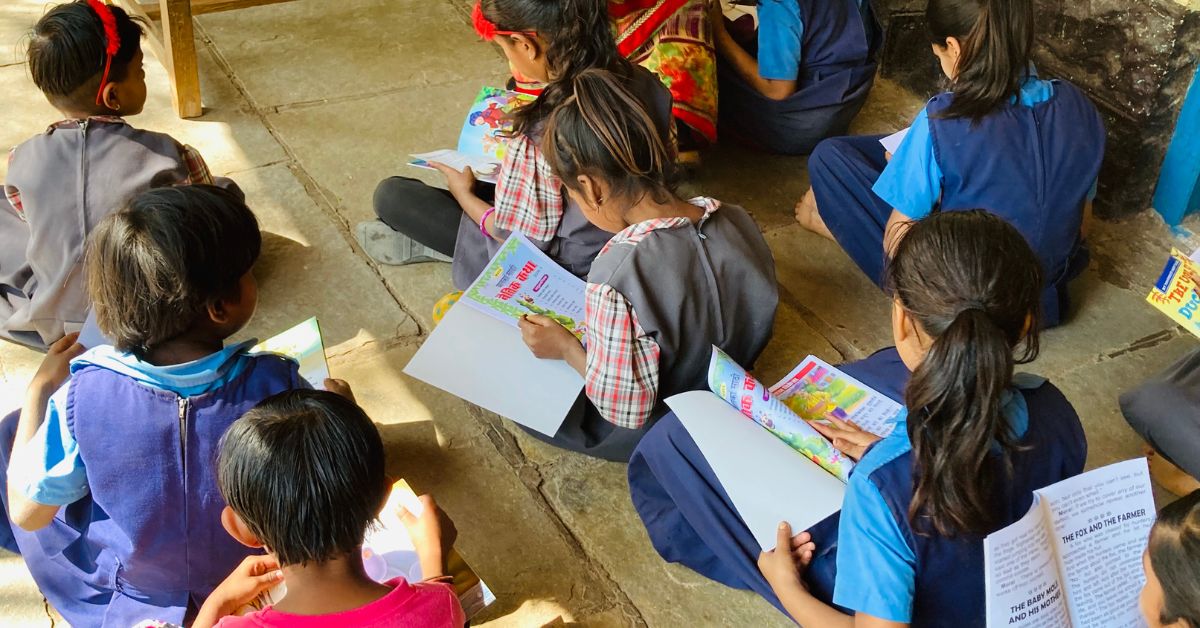
“Books make children dream — and English gives them the words to shape those dreams,” says Chetan Pardeshi, the man behind the unique concept of ‘mobile libraries’ at the Zilla Parishad level.
From one shelf to a state-wide movement
Chetan Pardeshi didn’t set out to start a library revolution. It began almost unintentionally — with a single bookshelf in a government school that had none.
“I was just looking to volunteer in a meaningful way,” Chetan recalls. “But when I visited these schools, I realised something simple yet heartbreaking: there were no storybooks, no colourful pages, no books that weren’t tied to exams. Children didn’t even know what it meant to read for fun.”
In rural India, this gap is especially stark. While infrastructure, midday meals, and basic instruction are in place, very few Zilla Parishad schools have access to engaging, age-appropriate English reading material.
That’s where S for Schools stepped in with a deceptively simple model: five schools per cluster, 50 carefully curated books per school, rotated every six months. All books are donated, and everything — from transport to installation — is managed by volunteers.
The impact was immediate.
At ZP School Gherewadi, where one of the first libraries was set up, teacher Babasaheb Kale still remembers the children’s surprise. “It was completely new to them — having books with colours, characters, and stories. But they took to it naturally. Most of the students wanted to read more.”
Vaishali Wadettawar, a teacher at ZP School Ghodhpeth in Maharashtra’s Chandrapur, happily notes, “Students can now make sentences in English with the help of a word or an object — this is a part of their curriculum. Earlier, they needed help with vocabulary, but now they manage without anyone’s assistance. Even Class 4 students are able to hold basic English conversations.”
Building confidence through language
At the heart of this initiative lies a quiet but powerful idea: early exposure to English can be transformational — especially for children in government schools, many of whom are first-generation learners.
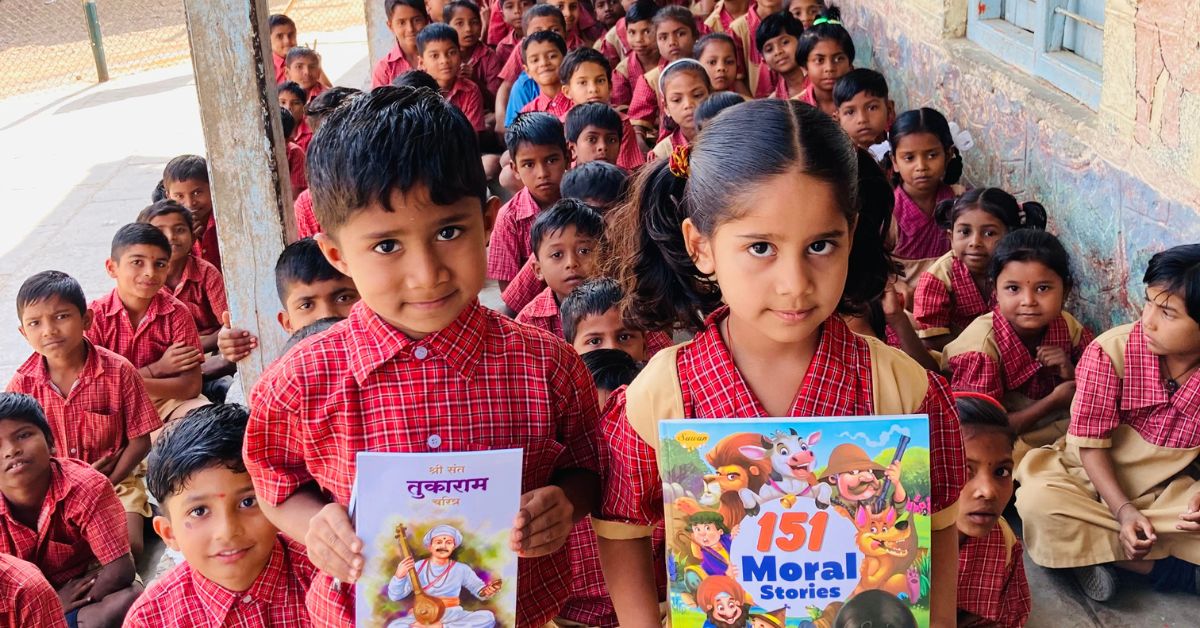
“English isn’t just a subject. It’s a bridge,” says volunteer Vaibhav Darwade, who has been part of the initiative since its early days. “In many of these schools, children struggle to express themselves beyond their textbooks. Storybooks in English allow them to learn the language in a playful, pressure-free way.”
The library’s focus is on books that are visually engaging and linguistically simple — large illustrations, short sentences, repetitive structures, and everyday vocabulary. Around 80 percent of the collection is in English, with the remainder in Hindi and Marathi to ensure accessibility.
“The aim is to build comfort with English — not just academically, but as a tool of expression,” Vaibhav explains.
The results have been encouraging. In one school, a shy student who rarely spoke a word of English stood up during an event and confidently delivered a speech about the saints of Maharashtra — inspired by a storybook she found in the library.
“Each Saturday we have a no-bag day. Students spend two hours reading books. Sometimes there are bigger or more complicated books they can’t manage. We ensure we read those aloud to them, translate where needed, and explain,” says Vaishali. “We also have stories of great personalities like Veer Bhagat Singh and Chhatrapati Shivaji Maharaj — these are crucial for children’s overall personality growth, and we pass on knowledge even we weren’t fully aware of before.”
In another village, children began visiting school during summer holidays just to borrow books, often bringing their parents along to share the stories.
“Language builds self-esteem,” says Chetan. “Once a child starts reading, they start thinking, then speaking — and eventually, believing that their voice matters.”
A volunteer-driven model with precision and heart
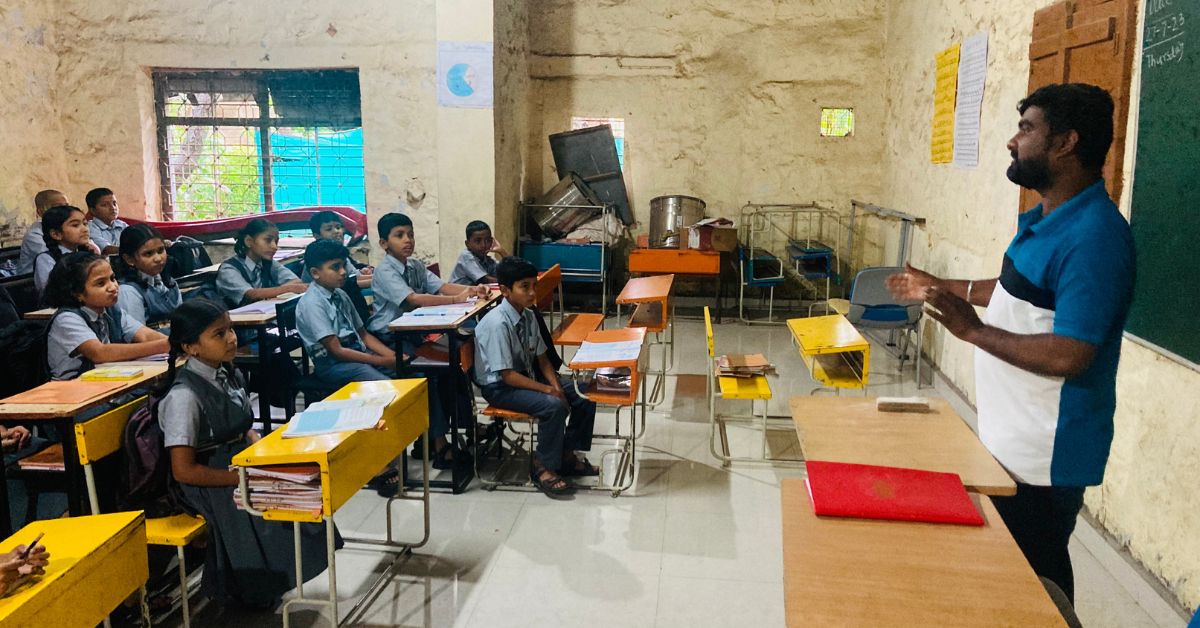
Though the libraries are compact — essentially portable bookshelves — the model is highly optimised. “Pick five schools, place five libraries, rotate every six months. That’s it,” says Vaibhav.
A simple one-page teacher guideline in English, Hindi, and Marathi ensures consistency in how the libraries are used.
But scaling this model hasn’t been easy. Many schools are in hard-to-reach areas, requiring hours of travel.
“I’ve driven four hours one way just to set up a single library,” Chetan says.
Since most installations happen on weekdays, working professionals find it difficult to join. Yet, over 80 volunteers across India have found ways to contribute by organising book collection drives, managing transport logistics, and liaising with teachers.
One key element to success has been identifying motivated teachers who see the value of the library. “When the teacher is invested, the whole school benefits,” Vaibhav says. “They use the books to run English speech contests, essay writing sessions, and even storytelling competitions.”
Parents, too, have welcomed this unique library system. “During summer vacations, we used to ask teachers to issue books to us because students were so fond of them. Our village doesn’t have a library with books that appeal to children. So, this becomes an added asset during holidays,” says the father of Bhargavi Asutkar, a Class 4 student at ZP School Ghodhpeth.
And despite operating without corporate funding or full-time staff, the initiative continues to expand — fuelled by passion, empathy, and a deep belief in the power of stories.
Not just a library: A space for growth and mentorship
The mobile libraries have quietly become more than just places to read — they’ve turned into emotional anchors for students: spaces to explore, express, and experiment.
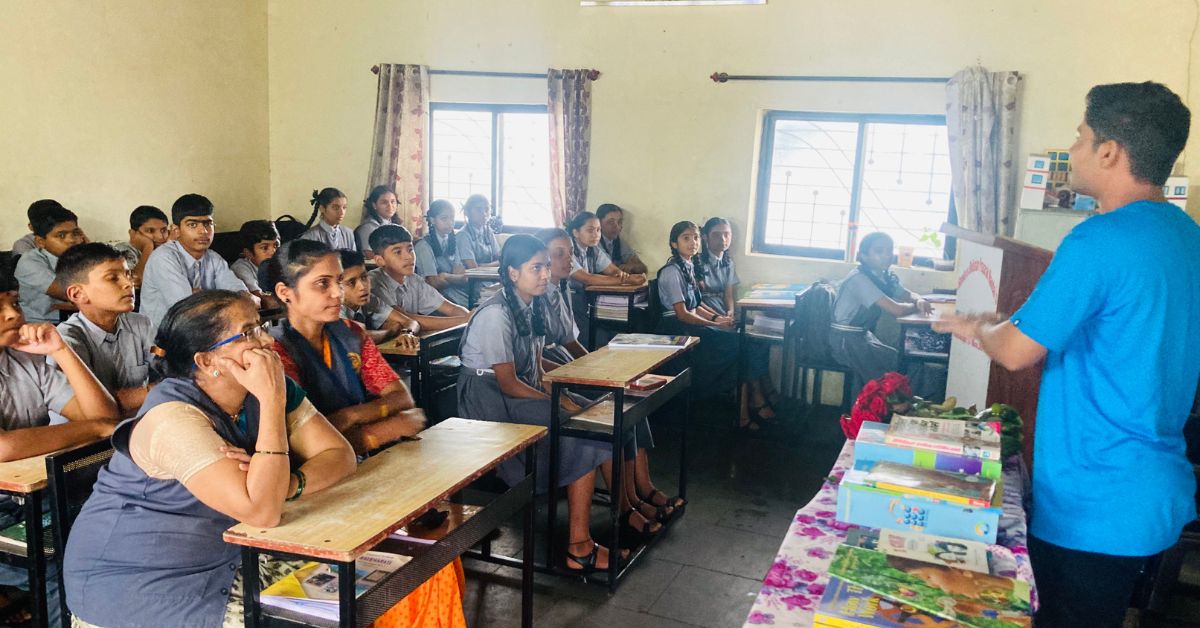
Chetan recalls how, in one village, children began borrowing books for their parents, eager to share their newfound stories. In another, a child who once struggled with English became the school’s go-to storyteller.
These transformations often ripple beyond the school. Chetan shares the story of his college friend, Praya, who had lost touch with him over the years.
“She reached out one day and said she wanted to do something meaningful for her wedding anniversary,” he says. “She and her husband spent the entire day installing a library and donating books. She even took leave from work. That moment stayed with me.”
New chapters are also unfolding — like Chapter 3: Meet the Mentor — where rural students virtually interact with professionals from diverse fields. “We want to bring access not just to books, but to real-world inspiration,” says Chetan. Plans for a library-on-wheels and regional volunteer leads are also in motion.
For everyone who wants to help, but doesn’t know how
Ask Chetan what holds people back from volunteering, and he doesn’t hesitate. “It’s not apathy — it’s uncertainty. People want to help, but they don’t know how.”
That’s where the simplicity of S for Schools stands out. All it takes is a book, a weekend, or a few hours of effort.
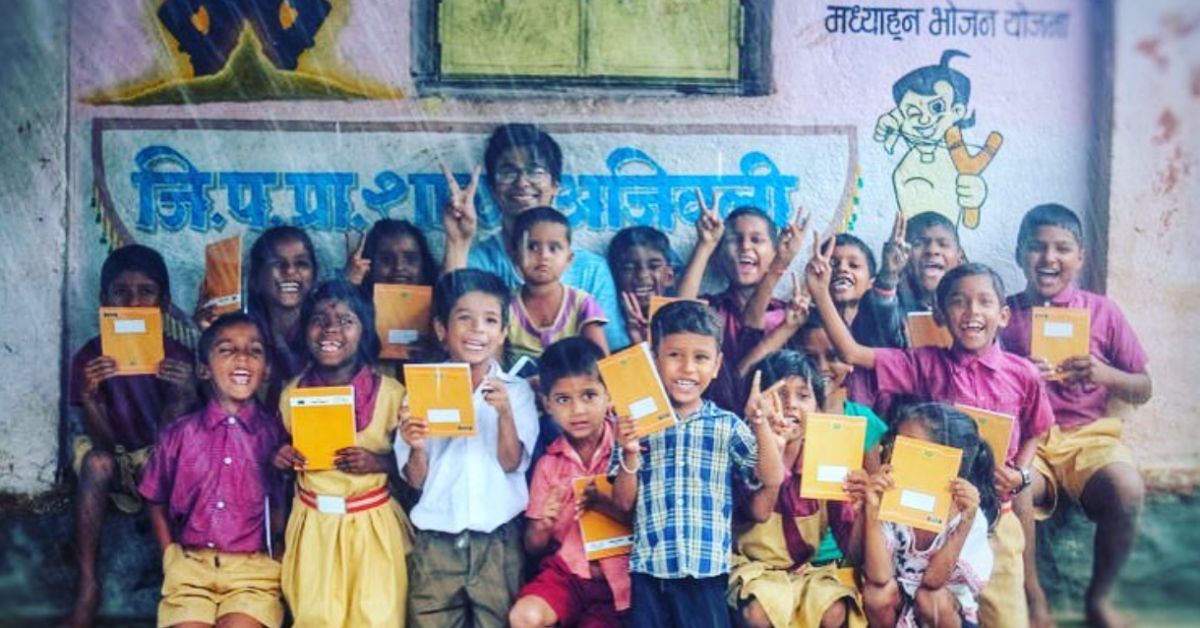
“This initiative is optimised in the best way so that maximum students benefit with minimal infrastructure,” says Babasaheb Kale. “There should be no second thought about contributing.”
Vaibhav adds, “It might look like children are just reading. But what they’re really doing is building a foundation for everything else — confidence, communication, curiosity.”
And for the child holding that storybook on the verandah, what begins as a quiet reading session could very well become the first step towards dreaming in English, speaking with conviction, and discovering a world much bigger than the one they’ve known.
What Chetan Pardeshi has built is not just a library system — it’s a quiet, grassroots revolution that believes every child, no matter where they live or which language they first speak, deserves access to stories that spark imagination and build confidence.
In a world where education is often reduced to marks and metrics, S for Schools dares to bring back joy, curiosity, and the power of language — especially English — as a tool of empowerment.
It’s a reminder that change doesn’t always come from grand gestures. Sometimes, it begins with a single shelf, a dog-eared book, and a few hours of your weekend.
If you’ve ever wondered how to give back, this is your invitation. Donate a storybook, volunteer to install a library, or simply help spread the word. Because for a child in a remote village, your small act could be the beginning of a lifelong love for learning — and a future spoken boldly in their own voice.
You can reach out to the S for Schools website to enroll as a volunteer or donate books.
As Chetan says, “When children learn to read, they begin to believe. And when they believe, the world opens up.”
All images courtesy Chetan Pardeshi
No comments:
Post a Comment